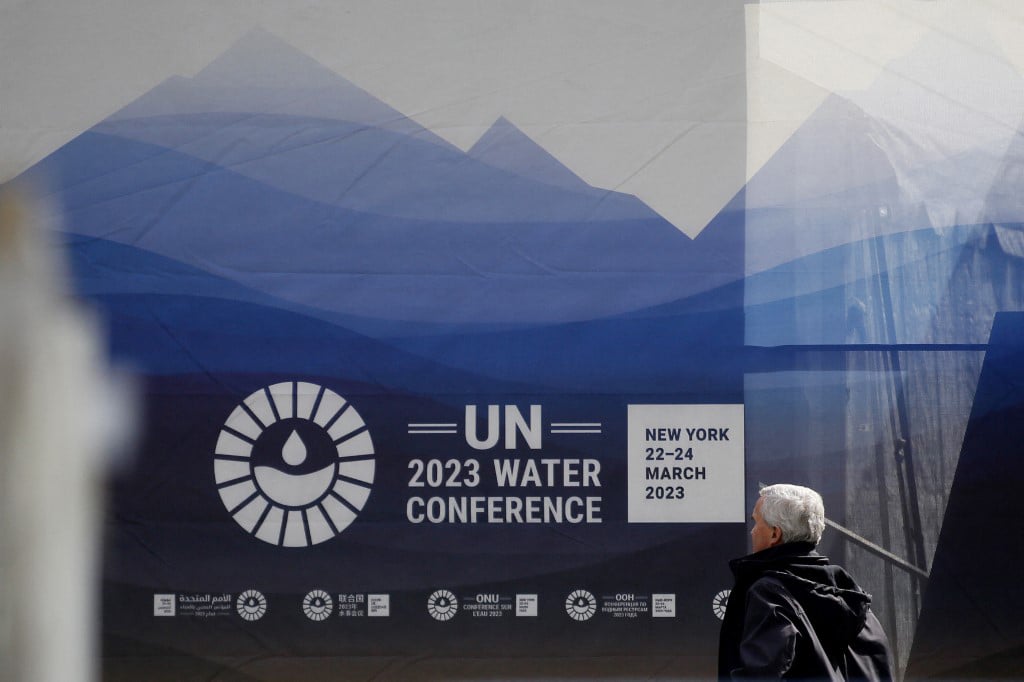
Author: Matt Luna / Fanack Water.
Resilience, restoration, and security in water-climate adaptation were matched with investment strategy in side events of the 2023 UN Water Conference, held from March 22-24. In order to achieve sustainable approaches, scientific and financial experts worked together with NGOs to cross disciplines and introduce solutions that necessitate new forms of collaboration among actors in the room and far beyond.
People around the world are dealing with the consequences of more extreme weather, which is often more severe in fragile or developing countries. According to an article in Nature co-authored by Henk Ovink, the Netherlands Special Envoy for Water and a key organizer of the Water Conference, rising temperatures are also increasing the amount of moisture held in the atmosphere, resulting in drier summers in regions such as the Mediterranean. It is clear that previous weather patterns and economic models cannot be used to build future resilience.
In the Conference side event “Placing Water at the Heart of Climate Action through Locally-Led Adaptation” on March 23, participants discussed how to ensure that investment in climate resilience is accessible to local actors. According to UN Water, a quarter of the global population – 2 billion people – lacks access to safe drinking water, and water-related disasters endanger community health while disrupting food security and income-generating activities. According to the World Economic Forum, the MENA region is “one of the most water-scarce regions in the world,” and the World Bank estimates that climate-related water scarcity could cost the region up to 14% of its GDP over the next 30 years.
Early warning systems based on satellite earth observation data on weather events can save lives, particularly during flooding, but they must be implemented locally to be effective. This requires a shift away from business as usual in order to increase investment in communities. The COP 28 meeting in the UAE this November-December, as well as the meetings leading up to it, will provide an opportunity to strengthen agreement on new paths forward and what is required for implementation.
Human-caused degradation of natural ecosystems is further driving changes in water cycles, which disrupt society and increase people’s vulnerability. In the side event “Nature-based Solutions for Water & Peace” on March 24, the Weather Makers, an engineering company aimed at restoring water cycles, used the Sinai area of Egypt as an example of land restoration initiative. More vegetation leads to more rain, so converting forests to agricultural land can have a significant impact on regional rain patterns. Interdisciplinary solutions co-created by indigenous populations and industrial actors can help to reverse some of the land’s impact and disrupted weather patterns.

“It is possible to restore large scale ecosystems. People’s lives have been improved, and they were the agents of change. We have a deep responsibility to contribute to the future of people by restoring the hydrologic cycle,” said John D. Liu, an ecologist/filmmaker who is working with the Weather Makers and Ecosystem Restoration Camps.
This side event on nature-based solutions was co-organized by the Hague Centre for Strategic Studies (HCSS). Laura Birkman, Head of the Climate and Security Program at HCSS, spoke about security-proofing nature-based solutions and climate adaptation by collaborating with the Water Peace and Security Partnership to identify “hotspot” areas of risk, which include North Sinai, Syria, Iraq, and Iran‘s Mazandaran Province. This strategy includes the following steps: 1) analyzing, 2) anticipating, 3) mobilizing, and 4) mitigating violent conflict threats in areas characterized by resource scarcity, rural-urban migration, and social unrest. Panellist General Tom Middendorp (Ret.) of the Netherlands, an expert advisor for HCSS, said, “There is no adaptation without security. We should work with civil actors to build in a conflict-sensitive way and invest in future systems that are less burdensome on resources, so people will not need to migrate.”
The Union for the Mediterranean (UfM) hosted a side event on March 23rd called “Water Finance in the Mediterranean,” which discussed ways to improve the financial sustainability of water management. Mohammed Chtioui, Director of the Tensift River Basin Agency in Morocco, raised the issue of how to more effectively establish and manage public-private partnerships for investments throughout the Mediterranean, with water tariff amounts being a recurring issue in pricing and adjusting during the session. Mr. Chtioui said, “With increasing water scarcity, we need to look at demand management of water, and reuse of water is newest pillar.” Water Team Leader, OECD Environment Directorate, Xavier Leflaive, presented guidelines to help countries in the region, such as redirecting global water subsidies to better research the people in need, ensuring strong regulation for water supply, sanitation services, and tariffs, and enabling water finance supported by an assessment of necessary conditions.
John D. Liu received a warm applause in the side event when he summed up feelings in a number of the discussions across the 2023 UN Water Conference: “Rather than building more ruins for future archaeologists to dig through, we should restore nature.” People are living in camps all over the world to help restore ecosystems and hydrologic cycles. If we make this the foundation of our economic systems, we will progress as a species.” At COP28, all eyes will be on the actors in key sectors to see where commitments to innovative and ecocentric approaches can be translated into real, sustainable action.

